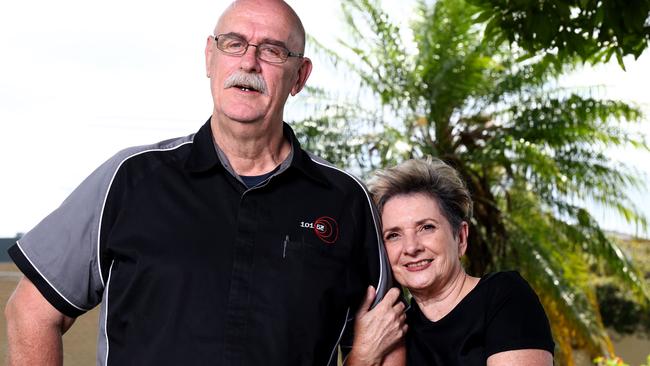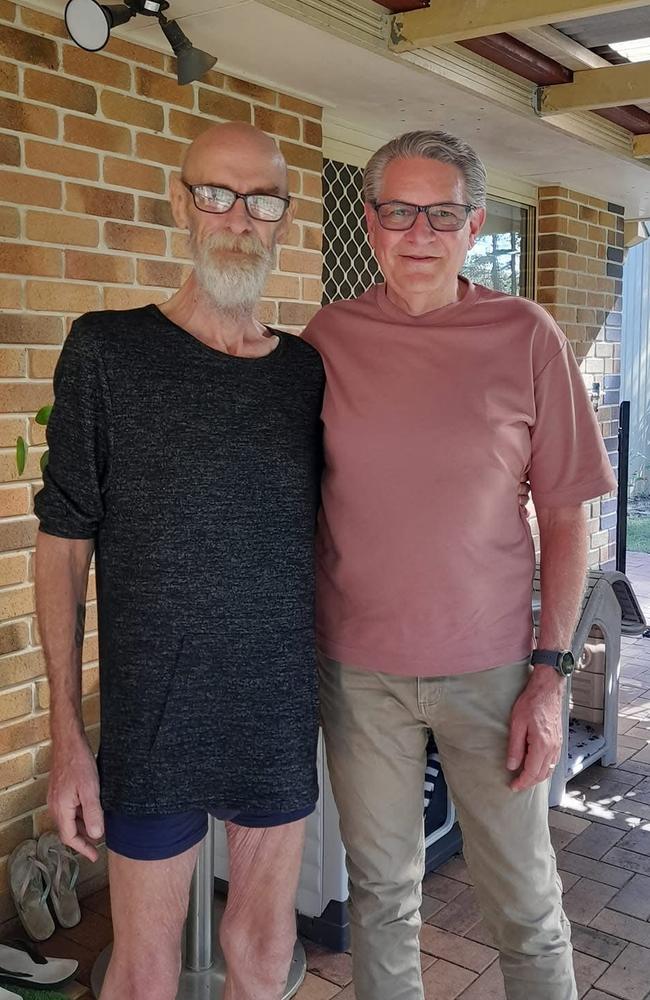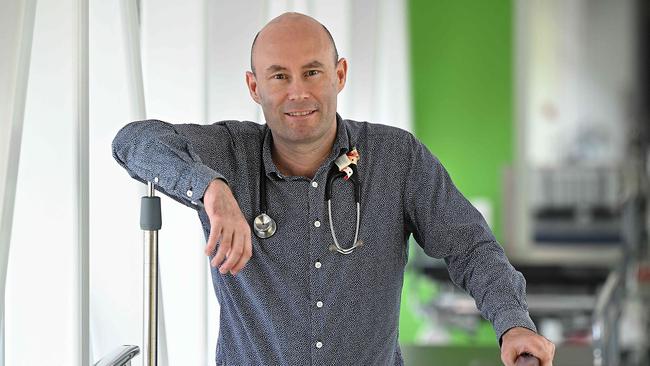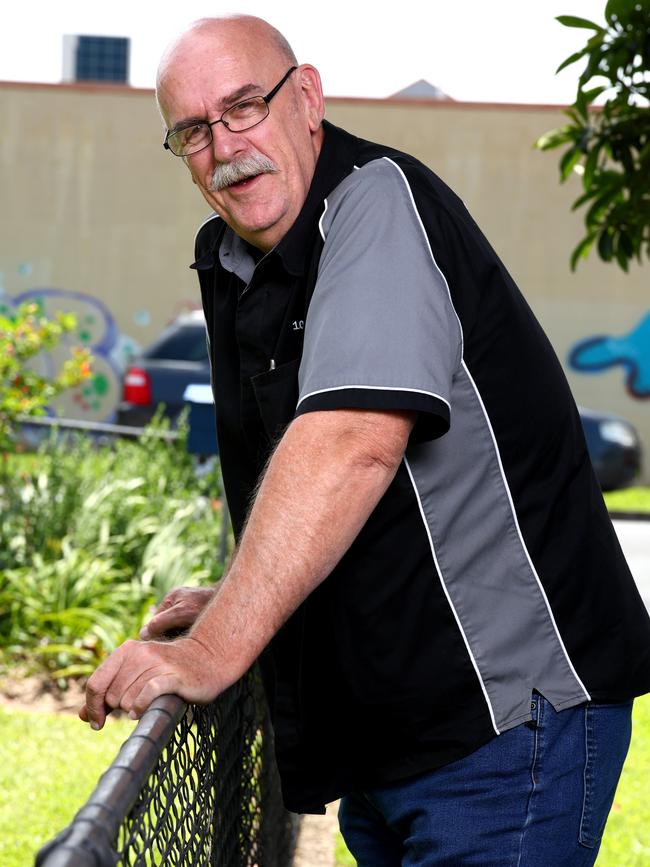How choice to die at home saved Craig Hewlett’s life after cancer hell
Craig Hewlett shouldn’t be alive to tell his story. He should have died three years ago, but a wonder drug dragged him back from the brink.

QLD News
Don't miss out on the headlines from QLD News. Followed categories will be added to My News.
Craig shouldn’t be alive to tell his story, in fact, he should have died three years ago, but a wonder drug dragged him back from the brink.
Two factors beyond his control helped to save his life – his rare and aggressive bowel cancer consumed so much of his body it became inoperable, and a timely decision by the powers that be to subsidise the lifesaving treatment through the Pharmaceutical Benefits Scheme.
Craig Hewlett’s journey began in September 2021 when he noticed unexplained weight loss. Tests showed a 16cm tumour at the bottom of his bowel.
“They said: ‘You’d better get your affairs in order because I don’t think you’re going to make it through to Christmas,” he said.
“The hardest thing I’ve ever done is that 50-minute drive back up the Bruce Highway (home).”
Doctors recommended pelvic exenteration surgery – the removal of reproductive organs, bladder, anus, some of the intestine, and the installation of stomas. Mr Hewlett was against this option, given the impacts on his quality of life.
Before his health issues, the 59-year-old was 157kg. But over the subsequent months, he dropped to an almost unrecognisable 55kg.
In March 2022, he collapsed at home and was rushed to Caboolture Hospital. His tumour had perforated his bowel.
“You’re in dire need, your whole body is very toxic,” Mr Hewlett was told by hospital staff.

He had two operations within five hours to stabilise his condition at Caboolture Hospital. He was then told to go to the Royal Brisbane and Women’s Hospital for the pelvic exenteration. Seemingly faced with no other option than the surgery he had tried to avoid, Mr Hewlett overruled his doctors.
“I decided I was going home – I wanted to eat my own food, and just sit in a chair with my feet on my own lawn, with my dogs, and my lady,” he said.
Two weeks later, he was inoperable. Unbeknown to him, he was about meet his guardian angel – oncologist Dr Matthew Burge.
“He was referred to us because the surgeons couldn’t help him,” Dr Burge said. “He would have had a few months to live.”
Remembering the crucial meeting, Mr Hewlett said Dr Burge “gave it to me straight”.
“He explained to me: ‘Mate I was thinking with this rare type of thing, do you want to be a guinea pig, or try your hand at chemotherapy?” Mr Hewlett described.
“And I said: ‘Give me the guinea pig option’.”
At the heart of the plan that was hatched was an immunotherapy treatment named Pembrolizumab, which the federal government subsidised under PBS for Mr Hewlett’s particular molecular subtype of colorectal cancer in August 2021.
“These very rare subtypes … manage to evade the immune system,” Dr Burge said.
“But all it takes is for Pembrolizumab to take away that curtain, that mechanism for hiding, and the immune system can see the cancer again.”

Mr Hewlett began treatment in May 2022 and had 25-30 Pembrolizumab treatments over 15 months. Without the subsidy, it would have cost $150,000 to $180,000.
“It felt like a miracle, I felt like I could climb the side of the building,” Mr Hewlett said.
“On the way home in the car with my partner Raylene, she said: ‘You just haven’t stopped talking, Craig’. Before then, I would sit in the passenger seat dying basically.”
Today, Mr Hewlett is cancer free, but still has six-monthly check ups.
“He ranks as one of the best patients I’ve had,” Dr Burge said.
“There’s no one better in terms of the way we turned his life around, there’s no two ways about it, the drug gave his life back to him.”

Mr Hewlett – who worked as a real estate agent before founding Moreton Bay community radio station 101.5FM, which he has run for the past 24 years – said his faith and will to fight kept him going in those dark months before Pembrolizumab.
“It was just resolve, keep digging in and having faith,” he said.
“I think the Lord has got more work for me to do, obviously it’s not my time to go.”
He also credited his partner of 30 years – Raylene.
“She’s a strong woman, but wow, I didn’t know she was that strong,” he said.
“She tells stories of lying awake at night, looking at the back of my head, not recognising me, and wondering whether this was going to be the night I didn’t wake up from.”
Pembrolizumab started as “the poster child drug for melanoma”, according to Dr Burge, but is now used to treat lung, kidney, bladder, stomach, oesophagus, and bile duct cancers.
The RBWH was involved in some of the earliest clinical trials of Pembrolizumab in treating advanced bowel cancer and Dr Burge believes the overall success of these trials contributed to the drug being subsidised by the Federal Government.
“The important message for everyone to understand is that while this is a very rare subtype of cancer, it must be checked for, it’s not a difficult test to do,” Dr Burge emphasised.



